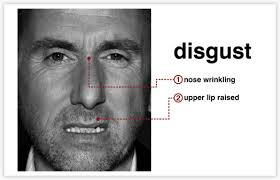记忆方法
1、dis- "opposite of" + gust-.
2、literally "distaste".
2、literally "distaste".
中文词源
disgust 憎恶
dis-, 不,非,使相反。-gust, 口味,品尝,词源同choose, gustatory.即不合口味,后引申为憎恶。
英语词源
- disgust
-
disgust: [16] Something that disgusts one is literally ‘not to one’s taste’. The word comes from Old French desguster, a compound verb formed from the prefix des- ‘not’ and goust ‘taste’. This in turn came from Latin gustus (ultimate source of English gusto); its modern French descendant is goût. Originally, as its derivation implies, disgust meant simply ‘cause to feel aversion, displease’ (and also, with subject and object reversed, ‘dislike, loathe’: ‘Had he not known that I disgusted it, it had never been spoke or done by him’, Robert South, Sermons 1716); but over the centuries it has hardened into ‘sicken, repel’.
=> gusto - disgust (n.)
- 1590s, from Middle French desgoust "strong dislike, repugnance," literally "distaste" (16c., Modern French dégoût), from desgouster "have a distaste for," from des- "opposite of" (see dis-) + gouster "taste," from Latin gustare "to taste" (see gusto).
- disgust (v.)
- c. 1600, from Middle French desgouster "have a distaste for" (see disgust (n.)). Sense has strengthened over time, and subject and object have been reversed; the older use looks like this: "It is not very palatable, which makes some disgust it" (1660s). The reverse sense of "to excite nausea" is attested from 1640s. Related: Disgusted; disgusting.
权威例句
- 1. I turned to Jacky, my nostrils flaring in disgust.
- 我转过身厌恶地看着杰基,鼻翼呼呼地翕动着。
- 2. She told him that her first reaction was disgust.
- 她告诉他自己的第一反应是厌恶。
- 3. He rolled his eyes heavenward in disgust.
- 他厌恶地翻着白眼。
- 4. I threw the book aside in disgust.
- 我厌恶地把书扔到一边。
- 5. Hean looked down at Bauer in undisguised disgust.
- 希恩低头看了看鲍尔,毫不掩饰自己的厌恶。
